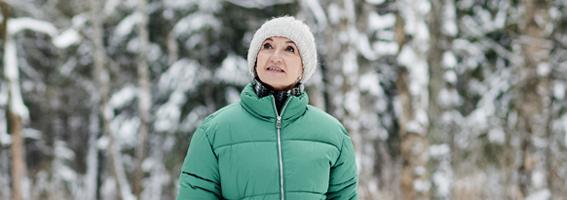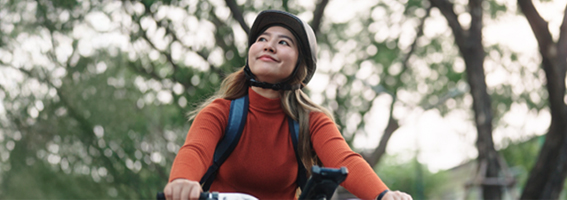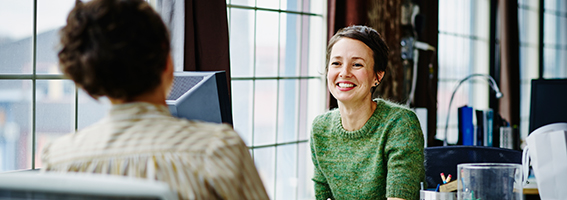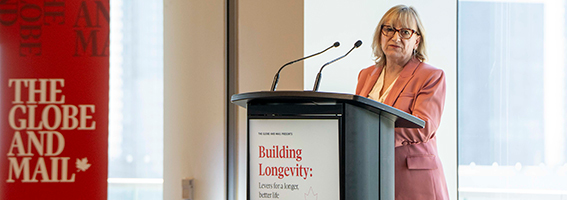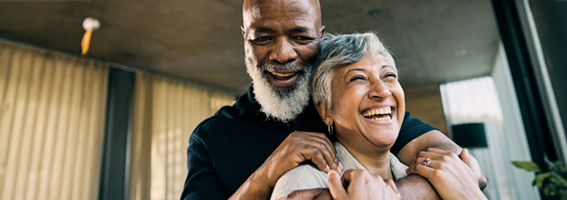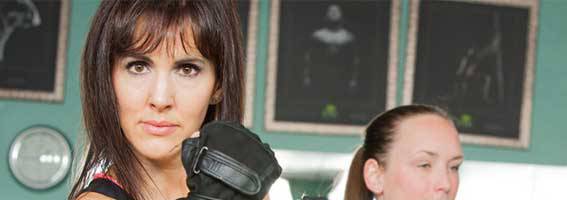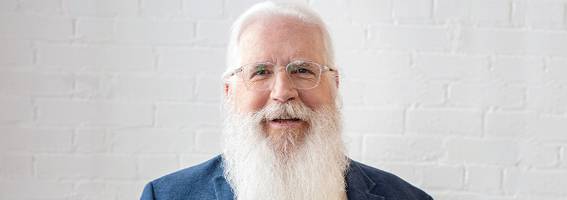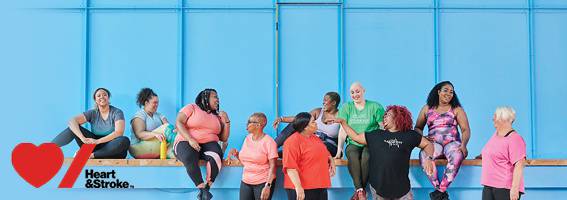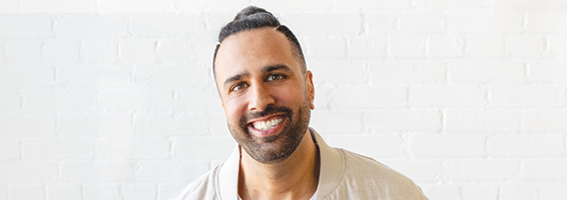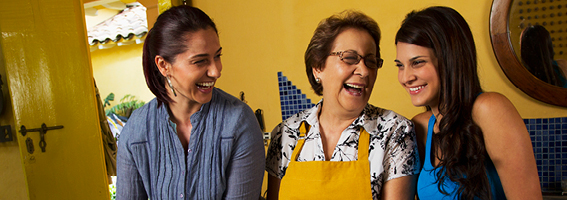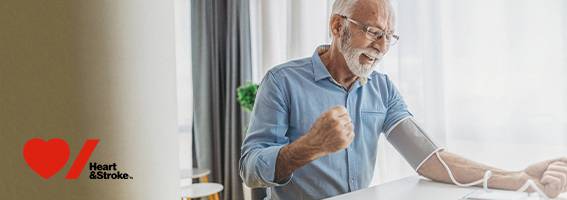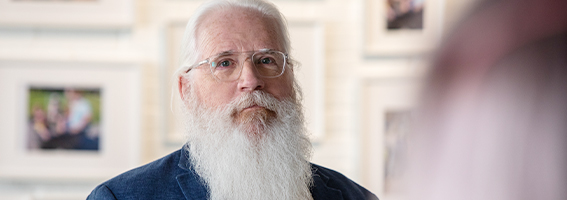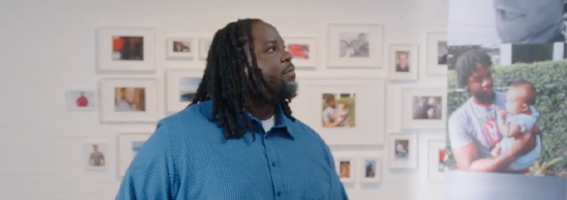On this page
Instruction: Change of selection promptly shifts the focus to a matching heading further down, on the same page.
Whether you’ve been living a healthy lifestyle or you’re thinking about making some changes for better health, we’re here to help you live healthier for longer – no matter your age.
Browse our collection of healthy living articles and Vitality Age™ Reveal videos that will uncover the truth about holistic health and longevity and help as you embark on your health and wellness journey.
Healthy living articles
How Much Do You Really Know About Seasonal Depression?
Dr. Gustavo Turecki breaks down common myths about seasonal affective disorder.
A Head-to-Toe Guide to Preventive Health
Everyday habits experts recommend for a longer life.
Good Question: Are couch workouts worth it?
An expert weighs in on whether "couchersizing" is legit—and how to make it a healthy habit
Why micro-habits work: an expert explains
Short bursts of healthy activity can deliver serious benefits to your health—and as an expert explains, all you may need is a few minutes
Parenting and health: A family doctor answers your questions
Handling stress, dealing with childhood mental health issues and the most important checks and screenings.
Demystifying menopause, one of the biggest health shifts for women
Information on brain fog, mental health and overall symptoms from a registered nurse.
Ask Her Anything: An expert answers common questions about fertility, egg freezing, and more
A registered nurse from Maven Clinic provides information about getting pregnant, egg freezing and when to talk to a doctor.
Ask Her Anything: An expert answers questions about maternity and newborn care
A registered nurse from Maven Clinic provides information about balancing work and pregnancy, and post-partum mental health conditions.
Health-boosting hobbies that build longevity
Everyday hobbies you love to do can bring outsized health benefits.
Good Question: Can you prevent type 2 diabetes?
Experts share how you can lower your risk for one of the fastest-growing chronic diseases in Canada
5 Simple Habits to Live a Longer and Healthy Life
Expert advice overheard at The Globe and Mail’s Building Longevity event.
Check-up check list: A guide to your next eye exam
Experts share key topics and questions to consider about vision, preventive eye health and more.
Why staying active is the real teenage dream
Most adolescent girls aren’t meeting recommended exercise guidelines, and many drop sports once puberty hits. Experts share why we should all work to reverse the trend.
5 ways to turn physical activity for teens into a life-long habit
Experts from Quebec’s FitSpirit and Olympic champion Maude Charron share how to encourage physical activity and healthy habits in teenagers.
3 pillars of health that support well-being as you age
As lifespans increase, taking care of your physical, mental and financial health may be the best investment you can make today for a better tomorrow.
Lessons in longevity
Learn about three habits that can have a big impact on health outcomes and boost longevity
Check-up checklist, when you’re over 60
What to ask about medication, brain health and routine screenings for your next doctor’s appointment
Good question: Can you prevent heart disease?
Experts from St. Mary’s PREVENT Clinic share what you can do to lower your risk of Canada’s second-deadliest disease
Check-up Checklist: What to ask your doctor in your 40s and 50s, according to experts
What to ask your doctor about cardiovascular disease, routine screenings and preventive actions that benefit long-term health.
8 Foods that are better than the fountain of youth
The food you eat has an enormous impact on your health and aging. So, what foods should you be adding to your diet at any age to age well?
Turn your home into a gym
Working out is a great way to keep yourself busy, healthy and reduce stress.
Benefits of adding protein to your diet
From breakfast and lunch, to snacks and dinner, we explain why it's always a good idea to add some protein-rich foods to your plate.
7 tips to disconnect from your smartphone
Smartphones can make our lives easier, but they also can be addictive. We have some great tips to help you disconnect from your phone and get a bit more active.
A Dietitian's Guide to Eating for a Healthy Heart
We asked registered dietitian and award-winning cookbook author Cara Rosenbloom to give us some expert and easy-to-follow advice on how to make good nutrition choices.
How a Canadian cyclist got back on the road after cardiac surgery
Like Alistair, you can get back to the things you enjoy. Read on to hear about Alistair’s story and how he got back on the road.
3 Heart healthy eating habits to live well and reduce your risk of heart disease
Let’s review three eating habits recommended by Heart & Stroke that play a role in helping you live well and reduce your risk of heart disease.
Make your eye health a priority with these 6 tips
Maintaining your eye health is an important part of healthy aging. Here are six tips to help you reduce your risk of developing eye disease.
5 types of foods that can protect the heart
If you want to switch up your diet to better care for your heart, know that there’s no need to deprive yourself! Here are five heart-friendly food choices that you can fit into any eating pattern
6 Dynamic stretches you can do at your desk
We all know that regular exercise has immeasurable health benefit. But what if you don’t even have time to leave your desk? These are 6 stretches you can do from the comfort of your work station.
Fuel your body, fuel your mind!
Prioritizing healthy eating is more important now than ever before.
How to get a good night’s sleep through the Daylight Saving Time transition
As North America finds itself caught up in a lot of red tape when it comes to abolishing Daylight Saving Time, there are things you can still do to combat the negative effects of DST on your sleep.
Ready, set, blend!
Move over banana bread and whipped coffee – it’s the smoothie’s time to shine. Give the Manulife Mix a try. It’s delicious and nutritious!
Strategies for fitter kids: Trading screen time for fun exercise
These days, electronic devices are a “normal” part of childhood. So how can parents motivate their kids to get the exercise they need? Here are some strategies to consider.
How food affects your mood: Food for good mental health
It’s been studied and documented for years that nutrition plays a central role in keeping our bodies fit and healthy. But have you ever stopped to consider how your food choices impact your mental well-being?
The unexpected benefits of reading
Did you know that reading for personal enjoyment and learning is good (and low-cost!) entertainment but can also bring many other benefits? Here are some ways that losing yourself in a good book can boost your overall well-being.
Stay on track with the "Golden Meal"
Focusing on one meal per day—your golden meal—can be the perfect motivator to help you get back on the healthy eating track if you’ve strayed from the dietary pattern you’d like to follow.
Fun and easy ways to get active
See some fun and easy ways to get your body moving.
How meal prep can make more time for nutrition
If you schedule some time during the weekend to prepare, cook and store your food, your belly and wallet will thank you later. Here are some tips to get you started.
Food, fitness & health: Live your healthiest life in your 60s and beyond
If you want to work towards living a healthy life in your 60s and beyond, read on.
How to start a vegetable garden at home
Spring has sprung, and it’s time to get back outside into the garden! Learn how you can start your own garden in six easy steps.
The immune-boosting power of exercise
There is one healthy habit that may go a long way in boosting your immunity— exercise! Read on to find out why daily exercise is worth the time and effort.
9 ways to eat healthy every day
How can you make healthier food choices each day? Here are some simple ways to improve your overall eating patterns.
Food, fitness & health: Live your healthiest life in your 20s
How can you start making your health a priority? It all comes down to healthy eating, exercise, and preventative screenings. Let’s explore what that means when you are in your 20s.
School of hard Knox
Sandi Knox describes how she turned a traumatic attack into a triumph of fitness: from taking self-defence classes to becoming a fitness mentor.
Finding your “why” at every age
While diet, exercise, and other health-related behaviours impact your life expectancy, you may be surprised to learn that having a purpose—or a “why”—is a main factor in longevity.
How to start a new exercise routine
The benefits to your mental health are just as important as the physical ones, particularly if you’re in isolation or under a lot of stress.
An easy guide to flossing for kids
Helping kids build healthy habits early on is a good idea. Especially when it comes to oral hygiene. Check out our easy guide to flossing for kids.
5 ways exercise can help you to live longer
Find out 5 ways exercise can help you live longer – and healthier!
Is it time for a digital detox?
While we all know it’s not realistic in today’s society to expect people to be able to completely disconnect from their devices, there is a lot to be said about scaling back the amount of time we spend connected to a screen.
Everything you need to know about influenza and the flu shot
If you have questions about the flu, why you should get the flu shot, and what groups are particularly at risk, this article is for you!
Mental health issues in your 60s: What you need to know
At every stage of our lives, we face different mental health challenges — from depression and anxiety to burnout and stress. Find out more about how to start looking after your mental health in your 60s
Living a healthy lifestyle on a budget
Here are six tips to help you live a healthy lifestyle while keeping your financial health in mind.
Creating healthy sleep habits
MindBeacon recommends these tips to keep your sleep on track.
What is biohacking & how can it help you?
You may have tried biohacking in the past without even realizing it. Let’s look at a few ways you can biohack and how it can help you live a long, healthy life.
Mental health issues in your 50s: What you need to know
At every stage of our lives, we face different mental health challenges — from depression and anxiety to burnout and stress. Find out more about how to start looking after your mental health in your 50s
10 ways to practice wellness this summer
With these ten summer-specific suggestions, you'll not only enjoy everything summer has to offer, but you'll also take steps toward living a healthier life.
How SMART goal setting can help you achieve your goals
When it comes to setting goals, do you feel a little lost? It may be time to start exploring how to set SMART goals.
How to cope with seasonal affective disorder
If you are suffering from seasonal affective disorder or are feeling a milder form of SAD, there are things you can do to help.
Coronavirus (COVID-19): Tips for taking care of your mental and physical wellness
Tips from Dr. Georgia Pomaki
Losing touch – Coping with the effects of virtual communication
Learn more about how virtual communication is affecting our mental well-being and 4 ways you can maintain a healthy balance between virtual communication and your mental health.
Why is my teenager having such a hard time?
Raising teenagers during COVID-19 is no easy task.
Loneliness and isolation
Coping with loneliness and isolation is not always easy.
5 changes to help your home support your mental health
From decluttering to the psychology of color to functional spaces that work for your lifestyle, there are a few easy changes you can make in your home that can immensely impact your mental health.
7 things to know about stress and your heart
Stress has a measurable effect on your health and your risk for stroke and heart events. Heart & Stroke has shared these seven things about stress and cardiovascular health you might not know.
How to limit screen time for kids
Be aware of the potentially negative impact of excess screen time on kids and get tips on how to limit it.
Organization overhaul: Discover the value of decluttering
The idea of decluttering your space is nothing new, but a recent trend alert points to a couple of different decluttering mindsets from very different corners of the globe: Sweden and Japan.
Signs of a heart attack in women
We break down the signs of a heart attack in women and share some tips on how to keep your heart healthy at any age.
8 tips to live to 100 and join the centenarian club
Looking to make your way into the Centenarian Club? These 8 actionable tips have helped many centenarians before you, and they can help you live a long and healthy life.
Why is sleep important for your heart health?
A good night’s sleep on a regular basis makes a huge difference in your outlook, in your energy levels and in your overall health. Here’s how and why you should make sleep a priority.
Mental health issues through the decades: What you need to know
It is never too soon or too late to start looking after your mental health. Taking care of your mental well-being should be a priority so it is important to be aware of the different issues that may arise.
The power of laughter
Want a health boost? Don’t underestimate the power of a great endorphin-releasing laugh! Here are some facts about laughter that may do good to your body as well as your soul.
The physical and mental benefits of workplace wellness programs
With more and more companies offering workplace wellness programs, employees can access tools to boost their overall well-being at the office. Here are just a few benefits of participating in a workplace wellness program.
6 tips to improve your memory
Everyone experiences forgetfulness occasionally. But when you start to notice those slips in your memory more often, it can be very disconcerting. Let’s take a look at some steps you can take to improve your memory.
How to raise healthy kids
If you are looking for actionable steps to help raise healthy kids who will become healthy adults, you’re in the right place!
Back to healthy habits
There’s no question the pandemic turned our lives upside down and took a toll on our overall well-being. Three long years have passed, and now it’s time to find ways to re-energize our physical and mental health.
Tips on returning to work after an illness
You might have thought it would never happen to you. Developing an illness or injury and needing to go off work. You have navigated your recovery path and are ready to get back. But where do you start?
Losing touch – Coping with the effects of virtual communication
Learn more about how virtual communication is affecting our mental well-being and 4 ways you can maintain a healthy balance between virtual communication and your mental health.
Men's mental health: A silent crisis
Let’s look at this silent crisis, explore what mental health concerns men should be aware of, and dig into six resources designed specifically for men’s mental health.
How to stay youthful at any age
If you are looking for more ways to tap into a feeling of youth and vitality, these five anti-aging tips will have you feeling youthful no matter what your biological age!
7 tips to disconnect from your smartphone
Smartphones can make our lives easier, but they also can be addictive. We have some great tips to help you disconnect from your phone and get a bit more active.
An easy guide to flossing for kids
Helping kids build healthy habits early on is a good idea. Especially when it comes to oral hygiene. Check out our easy guide to flossing for kids.
How to limit screen time for kids
Be aware of the potentially negative impact of excess screen time on kids and get tips on how to limit it.
Signs of a heart attack in women
We break down the signs of a heart attack in women and share some tips on how to keep your heart healthy at any age.
How your work can support your wellness
With so much of your time spent at your workplace, it makes sense to want to do whatever you can to make your job work for the good of your mental and physical well-being. And that comes down to finding a work-life balance that makes sense for you.
A heart attack transformed how this Canadian lives for his family
When faced with a life-altering event, many people will take that time to reevaluate their lives and refocus their priorities. And that is exactly what Iain did after having a heart attack.
5 things you need to know about strokes
There is a lot to know about strokes, and everything you learn can help you identify a stroke if it happens to someone you know. Let’s look at five things that will help you better understand them.
6 tips for more energy throughout the day
If you’re ready to reclaim your natural energy levels, these six tips can help! Thankfully, many of the most impactful factors are related to your lifestyle, so you have control over how these factors play into your life.
Food, fitness & health: Live your healthiest life in your 40s
Ready to take some concrete steps to help you live a healthier life through your 40s and beyond? Read on!
Put your oxygen on first: The science of self-care
Self-care can help to improve your well-being and mental health by giving you coping mechanisms to deal with the stressors of everyday life.
Mental health issues in your 40s: What you need to know
At every stage of our lives, we face different mental health challenges — from depression and anxiety to burnout and stress. Find out more about how to start looking after your mental health in your 40s
Surviving the holidays: Tips to maintain your sleep hygiene
Maintaining your sleep hygiene while enjoying your holidays is important. With these six tips, you’ll happily survive the holidays with a great night sleep every day.
Women, heart disease & stroke: The unique risks and signs to know
There are a unique set of risks and symptoms for women when it comes to heart and brain health. Here are some things you should know for yourself or the women in your life.
Adopting a healthy lifestyle: How to stay motivated long term
Looking to live a healthier lifestyle but can’t seem to stay motivated long-term? We’ve got 6 tips to keep you motivated to live your healthiest life.
Food, fitness & health: Live your healthiest life in your 30s
Ready to take some concrete steps to help you live a healthier life through your 30s and beyond? Read on!
Helping kids cope during coronavirus
We talked to Dr. Georgia Pomaki, who heads up Manulife Canada’s team of mental health specialists, about ways we can help them get through this.
Heart health tips and resources for taking care of the caregiver
Let’s take a closer look at some of the signs of caregiver stress, as well as resources and self-care ideas for caregivers.
How a clean kitchen supports good health
It is estimated that up to 4 million Canadians are affected by food-borne bacteria every year. The good news is that there are ways to thwart nasty germs and help prevent you and your family from getting sick.
How burnout led this Canadian to a holistic health transformation
Mike was 20 years into his career when he started experiencing the negative impacts of burnout. Find out what changes he made to leave burnout in the past.
The rise of the hobby
Hobbies can be just as beneficial to overall health as eating well and exercising regularly.
7 actionable steps to take at any age to prevent Alzheimer's disease
Researchers have been able to uncover a variety of risk factors that can help us take action today to help prevent the onset of dementia and Alzheimer’s as we age.
The science behind setting goals—and achieving them
Let’s explore the ins and outs of goal setting from a scientific perspective.
How to age actively—no matter your age!
When you hear “active aging” you probably start to think of older adults getting physically active to stay healthy as they age. And while that is a part of active aging, it is only one aspect of what active aging is and how you can participate in it.
6 tips to planning a wellness-boosting vacation
Whether you plan to hike Machu Picchu, spend a week at an all-inclusive resort, or take a long weekend exploring a new city, your next vacation can boost your mental and emotional well-being.
4 lifestyle changes to reduce your risk of type 2 diabetes at any age
Let’s dig into what type 2 diabetes is, the risk factors, and lifestyle changes you can make to reduce your risk.
Make no bones about it – a healthy skeleton can carry you a long way
Combine diet, exercise and good habits to keep you moving forward.
The fresh-air brain cure: How getting outside can boost your mental health
Getting outside offers rewards beyond decreasing stress and replenishing mental energy. It can help improve focus, sharpen memory and dispel negative thoughts—and can even change the way we think.
Why blood pressure matters
You’ve likely heard of high blood pressure, also known as hypertension, but what is it? This often silent condition puts you at higher risk for stroke and heart disease.
10 Simple strategies to manage stress
If you take small, actionable steps every day, you can manage your stress, mitigate the negative effects of stress on your body, and slow down your body’s aging process. These 10 tips to alleviate your stress response will help you stay healthy.
Coping with the mental effects of physical distancing
This is a strange and scary time but we’re here to help.
Check-up Checklist: What you should ask your doctor in your 20s and 30s, according to experts
It’s never too early to talk to your doctor about preventive health. Here’s what to ask at your next appointment.
Keeping a healthy outlook through the COVID-19 crisis
MindBeacon recommends these ways to keep a healthy outlook
Read more articles
Vitality Age™ Reveal
We spoke to people to understand how their life circumstances, habits and choices can unknowingly impact their health. Then we revealed their Vitality Age™.
Click on the videos to find out what happened next.
This is Sandy's story!
Sandy's main focus was caring for her family and her ill husband; she didn’t have time to take care of herself. Join Sandy as she discovers her Vitality AgeTM and learn about her plan for the next phase of her health journey.
